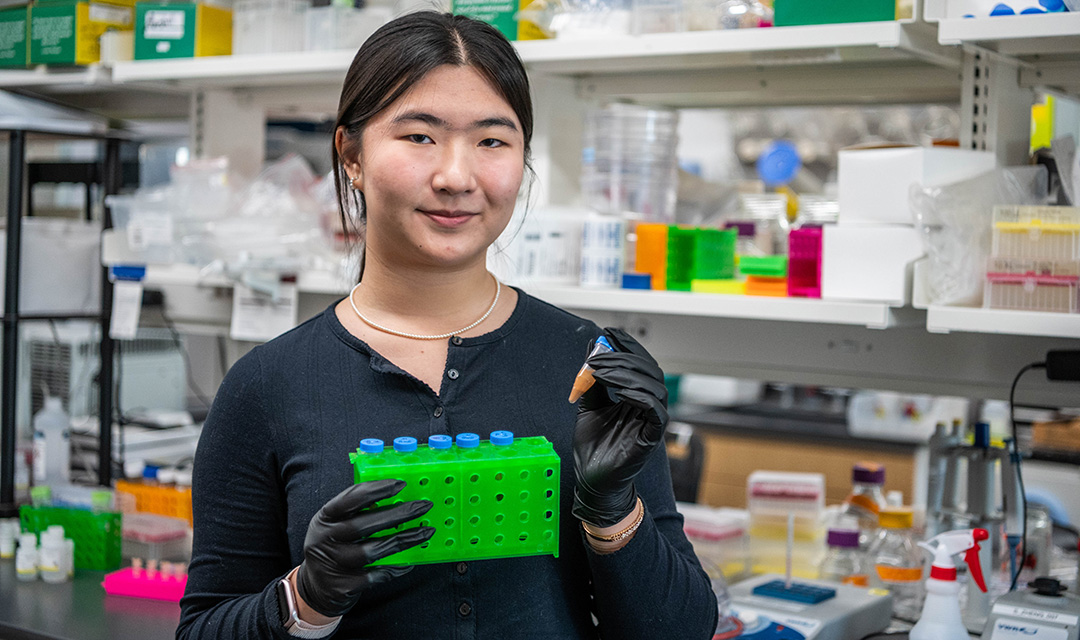SURF student takes on complex biomedical challenges
Caroline Sheedy
Apr 21, 2025

Source: Carnegie Mellon University
Carnegie Mellon University's Summer Undergraduate Research Fellowship (SURF) program provides funding for undergraduates to work full time on research projects during the summer. Many students continue those projects beyond that time, including Cindy Jiang, who worked with her mentor to ask big questions about basic biology.
Early detection, higher survival: Jiang's work targets pancreatic cancer
Pancreatic cancer is hard to detect, expensive to treat, and has an extremely high mortality rate. Jiang, a senior in chemical engineering and biomedical engineering, wants to find a way to change that.
Jiang worked with Siyang Zheng, a professor of biomedical engineering and electrical and computer engineering who leads the Micro & Nano Integrated Biosystem Laboratory (MINIBio). MINIBio develops technologies for biological and medical applications, including diagnostic tools to detect biomarkers for cancer.
Jiang's research focused on detecting KRAS Q61H, a mutation found on a gene that controls cell death and division. KRAS mutations can occur naturally, or be caused by exposure to chemicals like radon or those found in tobacco.
"KRAS mutations are present in approximately 25% of tumors, making them one of the most common gene mutations linked to cancer," Jiang said. "Mutation on the KRAS gene can be found in over 90% of pancreatic cancer patients, and also 32% of lung cancers, and 40% of colorectal cancers."
If researchers could detect this biomarker in blood samples, they may be able to diagnose pancreatic cancer much sooner.
Jiang said that could save lives.
"There are basically no early symptoms that we can see to be able to diagnose pancreatic cancer. It's very difficult to do tissue biopsy in the pancreas, and it's also hard to scan that area of the body," Jiang explained. "A lot of patients are diagnosed at Stage 4, which is basically terminal. Their survival rate is very, very low—about 3% of patients survive for five years. But if we could diagnose as early as stage one, we can raise the survivor rate to up to 44%."
Early detection is key, but not easy. To detect the presence of mutated genes in a blood sample, researchers use a common method called polymerase chain reaction (PCR) to increase the number of copies of the mutated DNA, making it more detectable. Jiang developed a targeted wild type blocker, a special molecule that binds to the wild type (normal, non-mutated) DNA in a sample, blocking it from replicating. Mutated genes, like Q61H, are amplified.
Jiang and her team had good results. They were able to confirm that the blocker does allow for selective and sensitive detection of low-abundance KRAS Q61H mutations. The next steps for this project are to optimize the blocker and eventually use it in a clinical setting.
The blocker is not only useful for early detection, Jiang explained.
"It's also useful for treatment monitoring. After treatments like radiotherapy, chemotherapy, or tumor removal surgery, some patients become cancer-free, but in many cases, the cancer returns, often without immediate symptoms," she said. "Tracking treatment effectiveness is crucial, and if cancer does recur, early detection allows for timely intervention. The blocker can help by detecting even the smallest traces of cancer cells in routine blood draws post-treatment, enabling clinicians to plan the next steps as early as possible to keep the cancer under control."
